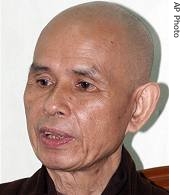-
(单词翻译:双击或拖选)
Ho Chi Minh City
22 February 2007
The renowned1 Zen Buddhist2 monk3 Thich Nhat Hanh has returned to his native Vietnam. Hanh, who has tens of thousands of followers4 in France and the United States, plans to conduct mass prayer ceremonies. It is Hanh's second trip back to his homeland since the 1960s, when he was exiled from what was then South Vietnam due to his anti-war views. In Ho Chi Minh City, Matt Steinglass has more, with additional reporting by Pham Van Trang.
 |
| Vietnamese Monk Thich Nhat Hanh talks during an interview in Hanoi, Vietnam (File photo - 29 March 2005) |
The Hanh, 80, and his entourage have come to Vietnam to conduct three large ceremonies, which he calls requiem5 masses, to honor the country's war dead. One will be held in each of Vietnam's major cities of Ho Chi Minh City, Hue6, and Hanoi.
Thich Phuoc Chi is a monk at Phap Van pagoda7 in Ho Chi Minh City, where Hanh will stay. He explains the goal of the ceremonies.
Chi says the ceremonies are a Vietnamese family ritual, which Thich Nhat Hanh has carried to a national level. He says they will honor the soldiers who fell on both sides of the Vietnam War, to eradicate8 hatred9 and to clear the false accusations10 against the dead.
Hanh moved to the West after being exiled from South Vietnam in 1966. He was a leader in the Buddhist Peace Movement that opposed the Vietnam War. In the United States, he became close to anti-war religious figures such as civil rights activist11 Martin Luther King.
In the West, Hanh developed a large following with an accessible version of Zen focusing on mindfulness or concentrating thoughts and actions on the present moment. His monastic group, the Order of Interbeing, has thousands of members, with centers in France, Vermont and California, and his books have sold millions of copies.
His works were banned in Vietnam until two years ago, when he reached an agreement with the government. He returned for the first time in February 2005 and lectured to thousands of curious Vietnamese monks12 and lay people.
Since then, Hanh's influence among Vietnamese Buddhists13 has grown. Thich Huan is another monk at the Phap Van pagoda, says both clergy14 and lay people read Hanh's books widely.
Thich Dam Nguyen, a monk at the Yen15 Tu pagoda in northern Vietnam, explains that Hanh's form of Zen is something new, especially in northern Vietnam.
Nguyen says Northerners traditionally practice an intensive sitting meditation16 called Tinh Do, whereas Hanh's Zen method can be practiced while walking around. Nguyen says he used to be afraid of Zen, but since Hanh's visit, he has begun to enjoy it.
Hanh's returns to Vietnam have provoked some dissension among Vietnamese Buddhists. Many of the monks Hanh started out with are now leaders of the Unification Buddhist Church of Vietnam, which is banned by the government.
The UBCV's leaders, Thich Quang Do and Thich Huyen Quang, have spent years in prison and under house arrest. Thich Quang Do refused to meet with Hanh when he returned in 2005, fearing the Vietnamese government would use Hanh's trip as propaganda.
In Paris, the UBCV spokesman, Vo Van Ai, said he was shocked that Hanh would visit Vietnam while UBCV leaders are under house arrest.
"I believe Thich Nhat Hanh's trip is manipulated by the Hanoi government to hide its repression17 of the UBCV and create a false impression of religious freedom in Vietnam," he said.
But the Vietnamese government has raised its own objections to Hanh's ceremonies, which are normally called "giai oan".
Chi says that the phrase "giai oan" means absolving18 people of false charges. But in the case of those who fought for South Vietnam, the government considers them guilty of betraying the Vietnamese people for what it calls an U.S. puppet regime.
Due to the sensitivity of the term "giai oan", Thich Nhat Hanh's deputy, Brother Phap An, says they have decided19 to call the rituals "equalization ceremonies".
 收听单词发音
收听单词发音
1
renowned

|
|
| adj.著名的,有名望的,声誉鹊起的 | |
参考例句: |
|
|
|
2
Buddhist

|
|
| adj./n.佛教的,佛教徒 | |
参考例句: |
|
|
|
3
monk

|
|
| n.和尚,僧侣,修道士 | |
参考例句: |
|
|
|
4
followers

|
|
| 追随者( follower的名词复数 ); 用户; 契据的附面; 从动件 | |
参考例句: |
|
|
|
5
requiem

|
|
| n.安魂曲,安灵曲 | |
参考例句: |
|
|
|
6
hue

|
|
| n.色度;色调;样子 | |
参考例句: |
|
|
|
7
pagoda

|
|
| n.宝塔(尤指印度和远东的多层宝塔),(印度教或佛教的)塔式庙宇 | |
参考例句: |
|
|
|
8
eradicate

|
|
| v.根除,消灭,杜绝 | |
参考例句: |
|
|
|
9
hatred

|
|
| n.憎恶,憎恨,仇恨 | |
参考例句: |
|
|
|
10
accusations

|
|
| n.指责( accusation的名词复数 );指控;控告;(被告发、控告的)罪名 | |
参考例句: |
|
|
|
11
activist

|
|
| n.活动分子,积极分子 | |
参考例句: |
|
|
|
12
monks

|
|
| n.修道士,僧侣( monk的名词复数 ) | |
参考例句: |
|
|
|
13
Buddhists

|
|
| n.佛教徒( Buddhist的名词复数 ) | |
参考例句: |
|
|
|
14
clergy

|
|
| n.[总称]牧师,神职人员 | |
参考例句: |
|
|
|
15
yen

|
|
| n. 日元;热望 | |
参考例句: |
|
|
|
16
meditation

|
|
| n.熟虑,(尤指宗教的)默想,沉思,(pl.)冥想录 | |
参考例句: |
|
|
|
17
repression

|
|
| n.镇压,抑制,抑压 | |
参考例句: |
|
|
|
18
absolving

|
|
| 宣告…无罪,赦免…的罪行,宽恕…的罪行( absolve的现在分词 ); 不受责难,免除责任 [义务] ,开脱(罪责) | |
参考例句: |
|
|
|
19
decided

|
|
| adj.决定了的,坚决的;明显的,明确的 | |
参考例句: |
|
|
|















